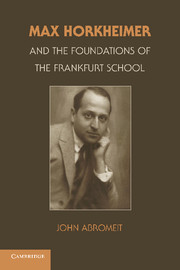Book contents
- Frontmatter
- Contents
- Acknowledgments
- A Note on References and Permissions
- Introduction
- 1 Coming of Age in Wilhelmine Germany
- 2 Student Years in Frankfurt
- 3 A Materialist Interpretation of the History of Modern Philosophy
- 4 The Beginnings of a Critical Theory of Contemporary Society
- 5 Horkheimer’s Integration of Psychoanalysis into His Theory of Contemporary Society
- 6 Horkheimer’s Concept of Materialism in the Early 1930s
- 7 The Anthropology of the Bourgeois Epoch
- 8 Reflections on Dialectical Logic in the Mid-1930s
- Excursus I The Theoretical Foundations of Horkheimer’s Split with Erich Fromm in the Late 1930s
- Excursus II Divergence, Estrangement, and Gradual Rapprochement
- 9 State Capitalism – The End of Horkheimer’s Early Critical Theory
- Epilogue
- Selected Bibliography
- Index
- References
2 - Student Years in Frankfurt
Published online by Cambridge University Press: 05 June 2012
- Frontmatter
- Contents
- Acknowledgments
- A Note on References and Permissions
- Introduction
- 1 Coming of Age in Wilhelmine Germany
- 2 Student Years in Frankfurt
- 3 A Materialist Interpretation of the History of Modern Philosophy
- 4 The Beginnings of a Critical Theory of Contemporary Society
- 5 Horkheimer’s Integration of Psychoanalysis into His Theory of Contemporary Society
- 6 Horkheimer’s Concept of Materialism in the Early 1930s
- 7 The Anthropology of the Bourgeois Epoch
- 8 Reflections on Dialectical Logic in the Mid-1930s
- Excursus I The Theoretical Foundations of Horkheimer’s Split with Erich Fromm in the Late 1930s
- Excursus II Divergence, Estrangement, and Gradual Rapprochement
- 9 State Capitalism – The End of Horkheimer’s Early Critical Theory
- Epilogue
- Selected Bibliography
- Index
- References
Summary
Biographical developments in the 1920s
After his near escape in May 1919 from the Munich police, who had mistaken him for Ernst Toller, and his parting of ways with Germaine Krull at the end of the summer, Horkheimer was ready to move to Frankfurt with Friedrich Pollock, where the two of them would continue their university studies. During the spring and summer of 1919, Horkheimer and Pollock attended lectures sporadically at the university in Munich, but they were too preoccupied with the volatile political situation and with preparations for their Abitur to take their studies seriously at this time. No longer enamored of the life of a bohemian artist and convinced that the “the revolution in the streets is over,” Horkheimer had decided that the best way to pursue his political ideals was to gain a rigorous understanding of the social, psychological, and economic factors that had made a catastrophe like World War I possible. The experience of the war was central to Horkheimer’s decision to attend the university. As he put it in a later interview,
The idea to study at the university did not come to me until near the end of the war, when I fully realized just how insane this war actually was…. What seemed absurd to me is that in a society like the one we live in, just like the others, one wages war instead of making each others’ lives more pleasant…. That in a common culture and among cultures … which should have respect for one another, people do not work together to make each other greater, more beautiful and more significant … but instead attempted to destroy one another, for any old silly reason that has not even been clarified. This is why I decided after the war to get my Abitur and to study at the university.
Horkheimer stresses repeatedly in his later recollections that he was not interested in an academic career at this point. He simply wanted to familiarize himself with the most advanced research in the social and human sciences in order to gain the best possible understanding of the chaotic world around him. Although he never gives any explicit reasons for his decision to attend the university in Frankfurt as opposed to another German university, after Horkheimer’s harrowing experiences in Munich, the relative political calm of Frankfurt certainly played a role. The innovative character of the university, the liberal tradition of the city, and its large Jewish community may have also played a role in Horkheimer’s decision.
- Type
- Chapter
- Information
- Publisher: Cambridge University PressPrint publication year: 2011



